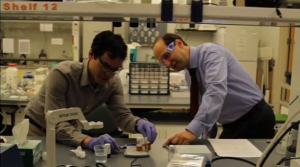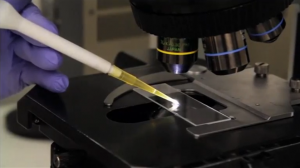 A new study published in the journal ‘Nature Nanotechnology’ has found that lignin-based, environmentally-benign nanoparticles (EbNPs) could replace the better known and less eco-friendly silver-based nanoparticles in pesticides.
A new study published in the journal ‘Nature Nanotechnology’ has found that lignin-based, environmentally-benign nanoparticles (EbNPs) could replace the better known and less eco-friendly silver-based nanoparticles in pesticides.
Nanoparticles are microscopic particles that exist in the environment and the silver-based nanoparticles are considered the most widely used in pesticides. While the silver-based nanoparticles exhibit broad anti-microbial properties that can kill bacteria, fungi and other microbes, they are also considered hazardous to the environment.
For that reason, Alexander Richter, a Ph.D. candidate at North Carolina State University’s Department of Chemical and Biomolecular Engineering, sought to find a replacement for the silver-based nanoparticles, which when left degrading in the environment leave behind a metallic core.
“Their post-application activity when released into the environment was actually seen as a potential concern by the U.S. Environmental Protection Agency. This is because the particles may stay active after the application, they may translocate after the application, they may kill good bacteria in the environment, which is undesired,” Richter said.
To find that replacement, Richter focused on the metallic core, which can remain active and continue releasing silver ions into the environment. 
“Our idea, or our approach, was to see if we can, if this is the problem, we replace the metallic core, which doesn’t participate in microbial action, with a biodegradable core. And by doing so, we could actually make the nanoparticles keep their functionality but make them degradable while also reducing the amount of the silver core in the nanoparticle system,” said Richter, whose work was awarded a $15,000 Lemelson-MIT Student Prize in May.
He found the answer in lignin, an organic polymer found in almost all plants and trees. He synthesized the lignin nanoparticle and infused its core with silver ions to replicate the anti-microbial properties of the silver.
This allows the lignin-based EbNP to kill bacteria but because of its lignin base it can also degrade and remain in the environment safely.
Richter tested the EbNPs on E coli in the lab and found the EbNPs require far less silver, making them more eco-friendly.
“Basically what we saw is that the particles accumulate on the cell membrane of e-coli, meaning in this case, bringing the highly active silver ions in close proximity to the bacteria, so they can activate the bacteria and use the silver more efficiently to its desired application,” Richter said.
Dr. Orlin Velev, INVISTA professor of chemical and biomolecular engineering, says because of the widespread application of nanoparticles, it was important to find a more eco-friendly alternative.

“Nanoparticles can have very interesting industrial and consumer applications, but the problems with those particles is that if you use them in the environment, the effects are not, potentially maybe not so good for environment or human ingestion, so the problem is how do you potentially remove that danger from engineered nanomaterials?” Velev said.
Together, he and Richter founded BENANOVA Inc., a start-up company based at the school’s Technology Incubator, to continue developing the technology surrounding the work on EbNPs. Among the possible applications are hygiene products, disinfectants, and chiefly agricultural pesticides.
Richter and Velev believe the EbNPs could be used to reduce the amount of chemicals in pesticides and improve crops.
“We believe that this can lead to a new generation of agricultural treatment products, that they’re going to be more efficient, that they’re going to use less chemicals, and that they’re going to be more friendly toward the environment,” Velev said.







